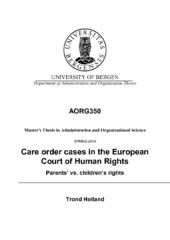Care order cases in the European Court of Human Rights - Parents' vs. children's rights
Master thesis
Permanent lenke
https://hdl.handle.net/1956/20265Utgivelsesdato
2019-06-20Metadata
Vis full innførselSamlinger
- Master theses [103]
Sammendrag
At present date, 47 States have committed to the European Convention on Human Rights (ECHR). The Convention aims to give all humans some basic human rights. Children are however not explicitly mentioned. The European Court of Human Rights (ECtHR) is the sovereign authority in interpreting the ECHR. Even though children are not explicitly mentioned in the ECHR, the ECtHR rule in cases involving children. This study aims to see how the ECtHR adhere to children’s human rights in cases involving both adults and children. More specifically, care order cases. By looking at the judicial precedent set by the ECtHR and combining statistical analysis with discourse analysis, this study aims to answer how the ECtHR balance the children’s and parents’ rights when ruling in care order cases. In order to get a better understanding of the main research question, this study will also look at who decides what is in the child’s best interest, to what extent children are granted rights under the ECHR, the ECtHR’s relation to the Convention on the Rights of the Child (CRC) and how the ECtHR assess cases stemming from 47 different judicial systems. The study revealed that both, biological parents and children’s rights, in care order cases where to a certain extent insignificant. It was the child’s interests that were the weighty argument. The finding showed that the ECtHR has in latter years turned towards a more child-centric approach. At present date, what is in the child’s best interests are paramount to consider when assessing care orders.
